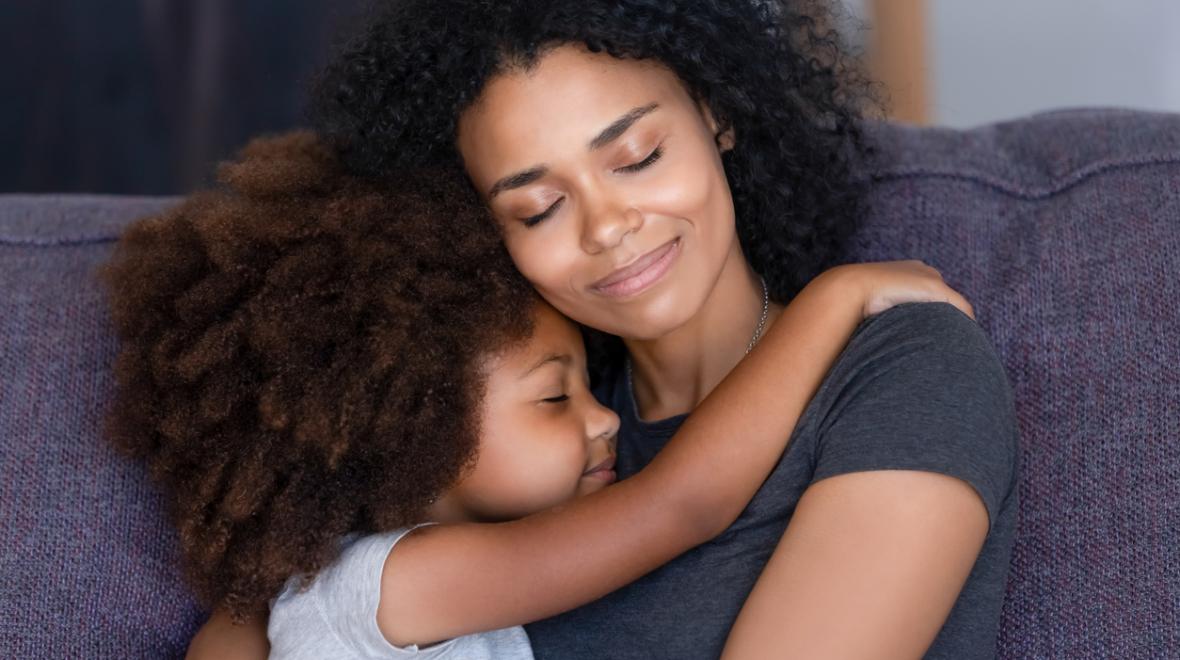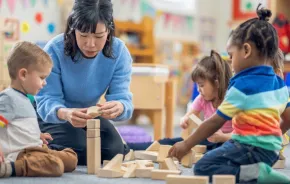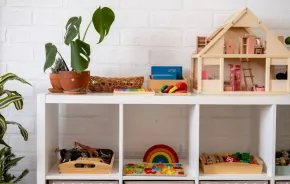
“When are we going to finish the ladybug, mama?” my 8-year-old asks innocently, looking a little bit concerned, since the papier-mâché balloon we made two weeks ago has been lying on the kitchen counter since then, sloppy and unfinished. These are not adjectives that would usually be applied to my parenting, nor my kitchen, and she knows it.
I kneel down to make eye contact with her and say, “Let’s get to that today. I’m sorry it’s taken so long to get this done, sweetie!” and I give her a little forehead nuzzle.
That was four days ago, yet the ladybug remains unfinished.
When the coronavirus crisis was first gaining momentum, there was impulse-buying in the stores, frantic news-scrolling and nail-biting over what would happen with the schools. During that time — two psychedelically fluid weeks back — we were living in another world. Many of us already-maxed-out parents, alarmed at the prospect of non-stop work plus childcaring and homeschooling, found ourselves investing fearful energy into planning and generating ideas.
Maybe we will be a family that learns to knit? Maybe my older child’s mild interest in making cookies will catch fire, and we will start a home micro-bakery? I pictured myself and my two daughters in cute aprons, pastry flour on our cheeks and noses, laughter in every scene of my fantasy mental montage. It will be the homeschool of life, I daydreamt, as my kids acquire real skills, and we grow closer by the day.
Each creative idea started out strong, with internet searches and the gathering of materials from all over the house, but then we’d get sidetracked. Someone would get hungry, so we’d detour for a snack. An important call would come in from work, and I’d have to take it. Inevitably, the kids would float back to a screen, leaving a giant mess for me to deal with. Then, somehow, it would already be time to start making dinner.
One by one, like a clunky machine in a 1950s sci-fi B movie, each light of inspiration flickered and then shut off.
Adult life requires us to function across a spectrum of activities and experiences that range from the utterly practical to the deeply meaningful. In family life, operating at full speed, the practical and meaningful are pistons firing simultaneously. We are a separate unit, but also interact with systems that are meant to give us a lot of support — our family wall calendar fills up with the tally marks of the modern family’s connected life.
Running a family is a highly structured efficiency business. It is also the most unpredictable and rewarding emotional work of a lifetime. In other words, it is an immensely vulnerable undertaking.
We talk a lot about vulnerability these days. Brené Brown, Ph.D., literally wrote the book on the power of vulnerability. With folksy humor, she articulates how people in American culture are reluctant to face the hard stuff in their individual lives with openness and courage, preferring instead to turn vulnerability against themselves (or others) in the forms of shame and judgment. Vulnerability, Brown says, “is not knowing victory or defeat, it’s understanding the necessity of both; it’s engaging. It’s being all in.”
When attachment is successful, a child’s development naturally unfolds from there.
As parents, we are at great risk of denying our own vulnerability and gunning straight for shame. As you can see with my example of turning the stress of months-long school closure into a manic productivity project, we are adept at spinning the gold of our children’s immensity of needs into the straw of our own imperfections. Even though we all rationally know that there will be many successes and failures in parenting and family life, we feel defeated when things don’t work out. We too easily forget Brown’s call to rise above value judgments of victory and defeat altogether and instead just be all in, rain or shine (and there’s plenty of the former).
Why do we do this? As a therapist and parent coach, I believe it’s because the job of being a parent is so essential and valuable, and yet, it is so painstakingly difficult to pull off. In part, the difficulty is the result of a culture that doesn’t support parents with adequate social policies or provide family-friendly workplaces (unless you are one of the lucky few with a healthy family network, a generous employer and financial resources in great reserves).
But this is also due to the challenge of doing this important work (and so much of it is work), with an open heart, especially in our busy times, which is precisely what is needed in order to remain vulnerable and not descend into shame or some other form of dysfunctional response.
Gordon Neufeld, Ph.D., a Canadian psychologist based in Vancouver and author of “Hold On to Your Kids: Why Parents Need to Matter More Than Peers,” is a foremost authority on attachment theory and the psychological and emotional development of children. He emphasizes the necessity of “keeping our hearts soft and open” — being emotionally available, warm and responsive, and connected to our own feeling selves — in order to promote good relations with our kids. The human heart can become more guarded — or hardened, as he says — as a result of trauma or loss. But ultimately, Neufeld’s theory holds, we can withstand a lot as children, as long as we have secure-enough attachments. When attachment is successful, a child’s development naturally unfolds from there, supported by a lot of assistance from his parents, of course, but not with a lot of stress on their part. Parenting, after all, is an animal instinct.
Complicated crafts and full wall calendars be damned, it’s a close and caring connection with our children that we really need to prioritize if we’re to help them reach their fullest potential, according to Neufeld.
Our main task as parents, then, is to protect the attachment, and to do that, we must keep our hearts soft while we also engage in the hard work of the practical variety. If we manage this with enough ease, and if we have the right external support and the resources we need to do our job as parents, then our kids get to keep soft hearts with us, which in turn promotes their own self-development.
We have the power to use this time as an opportunity to polish up some relating and self-regulating skills.
So, how does this play out today, in a time when we are without the structure of our regular lives, when our parent-support networks are less available, or when we might have a lot of conflict stemming from too much time cooped up together? How do we face our vulnerable humanness in these trying conditions so that we can all grow, and not get stuck in limbo like the papier-mâché balloon?
The answer might in fact be rather simple: We do this by putting our focus on our connection to our children, instead of on productivity and performance. We could use this time with a cleared calendar (Who could ever have imagined such a thing?) to be together, make messes, and maybe finish a thing or two, as and when we feel like it. We can go easy on ourselves and one another when nothing goes our way and we feel defeated.
And things will go badly occasionally. But we have the power to use this time as an opportunity to polish up some relating and self-regulating skills that a divided life often doesn’t make room for. As the world falls to a complete hush all around us, we can learn more about our kids and their needs — what works versus what doesn’t — instead of being resolute about strict adherence to rules and performance-based measures, both of which matter much less than our ability to navigate these circumstances well together.
The papier-mâché ladybug has now become a joke with my 8-year-old: She ribs me for my lazy attempt at this new thing, and I chase her around, exaggeratedly acting like I’m mad about it — all in good fun. I’m pretty sure this project can be chocked up to a full “fail,” and I couldn’t care less. And my independent older child? She has really gotten into baking, and with almost no help from me. On her own, she has decided to make breakfast most days: waffles, pancakes, sometimes cookies for later.
Turns out that all the sleeping in, long talks and walks, low stress and together time really does help hasten development. Almost as if it’s completely natural.











